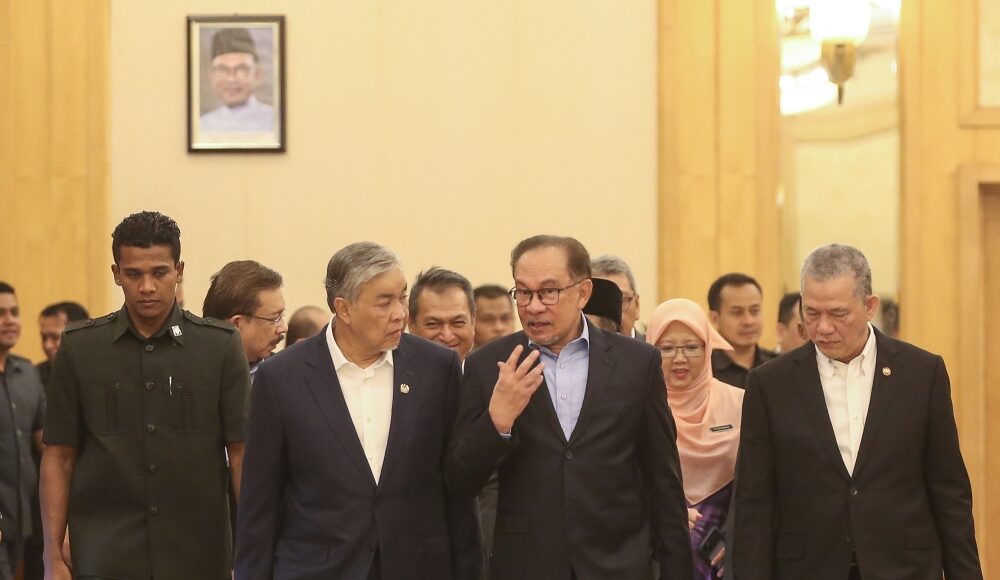Every Cabinet minister is a “yes-man” — Hafiz Hassan
MAY 12 — Economy Minister Rafizi Ramli on Sunday (May 11) expressed his readiness to step down from the Cabinet if he fails to retain his post as PKR deputy president in the party elections scheduled for May 24.
As reported by Astro Awani, he said the move would be a gesture of respect for the grassroots mandate.
Rafizi added that stepping away from ministerial responsibilities would allow him greater freedom to speak openly on various issues.
“Firstly, I would no longer carry the heavy burden of ministerial duties. Secondly, I would be happier — my hands and mouth would no longer be tied.” https://www.malaymail.
He gave the example of the re-appointment of Azam Baki as chief commissioner of the Malaysian Anti-Corruption Commission (MACC). Even if he disagreed with the appointment, he could not openly voice his disagreement.
“If I speak out, it could create difficulties for the prime minister, as the appointment is at his discretion,” he reportedly said during the Yang Bakar Menteri: Yang Berhenti Menteri programme.
You may not agree with the man, but you’ve got to agree with the man’s words.
In Frankly speaking written almost three years ago, I wrote about collective responsibility. https://www.malaymail.com/
Collective responsibility means decisions made by the Cabinet are binding on all members of the government. This means that if a minister disagrees with the Cabinet’s decision, he or she must still publicly support it.
A minister is entitled to express his or her views, but has to disagree privately. So, in Cabinet meetings he can be a “no-man”, but once the Cabinet has collectively decided he has to be a “yes-man”.
Unlike Nurul Izzah Anwar, Rafizi’s opponent for PKR deputy president position.
Nurul Izzah was widely reported on Saturday (May 10) to have described Azam Baki’s re-appointment as “unwelcome”. https://www.freemalaysiatoday.
Under collective responsibility, a minister who cannot abide by collective responsibility is expected to resign.
Collective responsibility is a fundamental convention of the British Constitution, whereby the government is collectively accountable to Parliament for its actions, decisions and policies.
The British Constitution is unwritten; the Malaysian Constitution is.
Article 43(3) of the Federal Constitution says the Cabinet “shall be collectively responsible to Parliament.” So collective responsibility is not just a constitutional convention in Malaysia. It is a constitutional principle.
As I said earlier, you may not agree with the man and may wish to call him “yes-man” too. During his Yang Bakar Menteri podcast, Rafizi said he wanted to remain the party’s number two as he does not want PKR to be filled with “yes-men” or “sycophants”.
But every Cabinet minister is a “yes-man”.
MAY 12 — Economy Minister Rafizi Ramli on Sunday (May 11) expressed his readiness to step down from the Cabinet if he fails to retain his post as PKR deputy president in the party elections scheduled for May 24.
As reported by Astro Awani, he said the move would be a gesture of respect for the grassroots mandate.
Rafizi added that stepping away from ministerial responsibilities would allow him greater freedom to speak openly on various issues.
“Firstly, I would no longer carry the heavy burden of ministerial duties. Secondly, I would be happier — my hands and mouth would no longer be tied.”
He gave the example of the re-appointment of Azam Baki as chief commissioner of the Malaysian Anti-Corruption Commission (MACC). Even if he disagreed with the appointment, he could not openly voice his disagreement.
“If I speak out, it could create difficulties for the prime minister, as the appointment is at his discretion,” he reportedly said during the “Yang Bakar Menteri: Yang Berhenti Menteri” programme.
You may not agree with the man, but you’ve got to agree with the man’s words.
In Frankly Speaking written almost three years ago, I wrote about collective responsibility.
Collective responsibility means decisions made by the Cabinet are binding on all members of the government. This means that if a minister disagrees with the Cabinet’s decision, he or she must still publicly support it.
A minister is entitled to express his or her views, but has to disagree privately. So, in Cabinet meetings he can be a “no-man”, but once the Cabinet has collectively decided he has to be a “yes-man”.
Collective responsibility means decisions made by the Cabinet are binding on all members of the government. — Picture by Yusof Mat Isa
Unlike Nurul Izzah Anwar, Rafizi’s opponent for PKR deputy president position.
Nurul Izzah was widely reported on Saturday (May 10) to have described Azam Baki’s re-appointment as “unwelcome”.
Under collective responsibility, a minister who cannot abide by collective responsibility is expected to resign.
Collective responsibility is a fundamental convention of the British Constitution, whereby the government is collectively accountable to Parliament for its actions, decisions and policies.
The British Constitution is unwritten; the Malaysian Constitution is.
Article 43(3) of the Federal Constitution says the Cabinet “shall be collectively responsible to Parliament.” So collective responsibility is not just a constitutional convention in Malaysia. It is a constitutional principle.
As I said earlier, you may not agree with the man and may wish to call him “yes-man” too. During his Yang Bakar Menteri podcast, Rafizi said he wanted to remain the party’s number two as he does not want PKR to be filled with “yes-men” or “sycophants”.
But every Cabinet minister is a “yes-man”.
* This is the personal opinion of the writer or publication and does not necessarily represent the views of Malay Mail.





